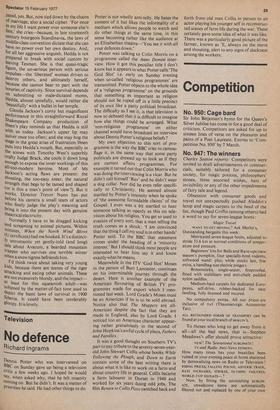Television
No defence
Richard Ingrams
Dennis Potter who was interviewed on BBC on Sunday gave up being a television critic a few weeks ago. I hoped he would say, when asked why, that he telt insanity corning on. But he didn't. It was a matter of Priorities he said. He had other things to do. Potter is not wholly anti-telly. He hates the content of it but likes the informality of a medium which allows people to watch and do other things at the same time, in this sense becoming rather like the audience at an Elizabethan theatre—'You see it with all your defences down.'
Potter was talking to Colin Morris on a programme called the Anno Domini interview. How it got this peculiar title I don't know but it appears in what Potter calls 'The God Slot' i.e. early on Sunday evening when so-called 'religious programmes' are transmitted. Potter objects to the whole idea of a 'religious programme' on the grounds that something as important as religion should not be roped off in a little precinct of its own like a party political broadcast. The difficulty as I see it, is that television is now so debased that it is difficult to imagine how else things could be arranged. What 'non-religious programme' on either channel would have broadcast an interview about Dennis Potter's religious beliefs?
My own objection to this sort of programme is the way the BBC tries to camou flage it, in the same way that some party politicals are dressed up to look as if they are current affairs programmes. For example it turned out that Colin Morris who
was doing the-interviewing is a vicar. But he didn't call himself 'Rev' and he didn't wear
a dog collar. Nor did he even refer specifi cally to Christianity. He seemed almost startled by Potter's intensity when he spoke of 'the awesome formidable claims' of the Gospel. I even was a bit startled to hear someone talking as openly as this on tele vision about his religion. You get so used to evasion of every sort, that a man telling the truth comes as a shock : 'I am convinced that the thing I call my soul is in other hands' Potter said. To the BBC that statement comes under the heading of a 'minority interest.' But I should think most people are interested to hear him say it and know exactly what he means.
Meanwhile in the ITV 'God Slot' Moses in the person of Burt Lancaster, continues on his interminable journey through the
desert. Here is another example of the American flavouring of British TV pro
grammes made for export which I men
tioned last week. Lord Grade's Moses must be an American if he is to be sold abroad. Notice also that The Muppets are all
American despite the fact that they are made in England, also by Lord Grade. I noticed too an American character appear
ing rather gratuitously in the second of John Hopkins's awful cycle of plays, Fathers and Families.
It was a good thought on Southern TV's part to pay tribute to the seventy-seven-year
old John Stewart Collis whose books While Following the Plough, and Down to Earth contain some of the best writing there is
about what it is like to work on a farm and about country life in general. Collis became a farm labourer in Dorset in 1940 and
worked for six years doing odd jobs. The film Return to Collis Piece switched back and
forth from old man Collis in person to an actor playing his younger self in reconstructed scenes of farm life during the war. These certainly gave some idea of what it was like. There was a particularly good picture of the farmer, known as 'E, always on the move and shouting, alert to any signs of slackness among the workers.


































 Previous page
Previous page